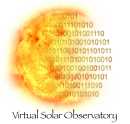Virtual Solar Observatory
Extended Outage of SDO/HMI, SDO/AIA, and IRIS Data Processing and JSOC Data Service
Posted by: Todd Hoeksema
On Tuesday November 26 a 4-inch chilled-water pipe in the Solar Dynamics Observatory (SDO) Joint Science Operations Center (JSOC) server room broke. This caused major flooding in the building and extensive water damage in the lab that houses the machines that process and distribute data from the Helioseismic and Magnetic Imager (HMI) and Atmospheric Imaging Array (AIA) instruments and from the IRIS spacecraft. The Stanford JSOC team is working to assess the extent of the damage, but it is severe. Science data processing for HMI, AIA, and IRIS will be down for an extended length of time, as will access to the archived data at JSOC.
Please consult SOC_Emergency_Resources for possible ways to gain limited access to some earlier SDO data. IRIS Level 2 data through November 22, 2024 remain available at [iris.lmsal.com/search iris.lmsal.com/search/].
The data capture systems for all three instruments remain functional, so ultimately incoming data are not expected to be lost. Instrument health and safety monitoring is being handled at the Instrument Operations Center at the Lockheed Martin Solar & Astrophysics Lab (LMSAL). The instruments continue to function normally.
The team will provide updates as more information becomes available. We deeply regret any inconvenience and appreciate your patience as our team prioritizes the repair and recovery of the affected systems.
Welcome to the Virtual Solar Observatory! For the latest VSO updates, check out our News page.
The VSO is a tool for investigating the physics of the Sun. Users may search existing databases for terrestrial and space-based observations, hiding the details of where the data is and what’s needed to get it. A researcher can use the VSO to search across multiple instruments and events, to find datasets of interest, and having done that, transparently download them to their workstation.
VSO Status
A Health report for the IDL and SunPy clients, detailing the status of all the current Data Providers can be found at VSO Health Report
Search the VSO
There are many ways to use the VSO to search and download data. The main two ways are:
- Via our web interface and
- Via SolarSoft in IDL
Because we publish our API, users can use their favorite programming language to access the VSO including SunPy and WSDL.
The VSO web and data interfaces are a singular model mirrored across multiple sites such as the NASA Solar Data Archive Center, the National Solar Observatory and the Smithsonian Astrophysical Observatory. The data archives themselves are distributed, residing with the groups that designed, built and used the instruments to collect the data; they possess the expertise required to fully exploit the data.
Follow us on ![]() Facebook
and
Facebook
and ![]() Twitter.
Twitter.
Data Products
We have observations available from sources as diverse as NASA’s space-bourne Solar Dynamics Observatory and the ground-based GONG instrument. Observations go back nearly 100 years, such as from the Mt Wilson 60ft spectro-heliograph. We are proud of our international partnerships and we are always looking to serve more data whenever possible. A current list of our data providers can be found here: http://vso.nascom.nasa.gov/cgi-bin/show_details.pl?keyword=PROVIDER
Our data is generally provided as FITS files but may also be in other standards, such as XML or HDF.
- Check out our News page for new and updated datasets
Contact Us
If you have problems with this site, please contact the site admin, with the nature of the problem.
For general problems or questions, please visit our two google mail groups at http://groups.google.com/group/vso-api and http://groups.google.com/group/vso-idl
News
For the latest VSO updates, check out our News page.
The VSO Documentation Site is being updated
2022 November 30
We are in the process of adding new documentation and tightening up our categories to make the existing documentation more helpful. Please bear with us as we construct new pages.
Recent Meetings
The recent presentation list needs to be updated; older presentations can be found at Past Meetings
Data Model
The current version of the data model is Version 1.8 (updated 2005 May 20).
Frequently Asked Questions
User Questions
- How do I search for data using the VSO?
- How do I get the data?
- What are the holdings of each data provider?
- How can I get a URL to the data products that I've found?
- How can I make a movie?
- Why do I get records I wasn't expecting when I search?
- Why do I get fewer records than I was expecting when I search?
- How do I search for data using catalogs?
Data Provider Questions
- How can I become a data provider?
- What meta-data is used by a Data Provider and how is that meta-data used
- How do the JSOC and SHA Data Providers work
Application Programmer Questions
- How can I access the VSO through my own interface?
- How can I get the browse images (jpeg, png, gif, etc) for observations?
- How can I get a URL to the data products?
Also see our infrequently asked questions list.
Bug Reports
Anonymous creation of new tickets is disabled. Please e-mail any bug reports to help@….
